CUBA with low budget – a short guide
March 7, 2007
Topics: Cuba
In other countries we always hitch-hike and do not pay for accommodation, we cook ourselves using fuel-stove, we sleep in a tent or are invited to stay with local people.
We have travelled in Cuba for few weeks and discovered several tricks to make the stay in this country as cheap as possible. To stay low budget is not easy, but possible.
Money
Before talking about other things, a short overview about circulating currencies in Cuba. They have Cuban pesos, which in Spanish are called moneda nacional (national coin), pesos cubanos (Cuban pesos) or simply pesos. With this currency one can pay in the markets, in most of the snack-bars (cafeterias), and for other things sold on the street. The Salary for Cubans is paid in this currency, and it varies from 100 to 700 pesos (5-30 USD) per month, depending on the qualifications and position. The interesting part is that some of the daily goods are not available in Cuban pesos. Cubans have to go to a, so called, La Cadeca (money exchange office) and buy there Cuban convertible pesos (CUC), which cost 25 national pesos each. Only then one can buy for example soap or toilet paper.
Roughly, 1 CUC equals to 1 USD. To convertible pesos people also refer as dolares (dollars), divisas (currency) or simply pesos (the same as for national pesos). CUC one also gets from the ATM machines, or in the banks when selling foreign currencies. With this currency tourists pay for rental cars, accommodation and intercity public transport. Moreover there are lots of “chopis” – shops where food, clothes and other goods are sold in CUC. Chopi is also the place to buy soap (cheapest costs 0.25 USD) or other necessary daily products.
During your travels in Cuba you will need two pockets – one for CUC coins and another for Cuban pesos. You can buy Cuban pesos with your CUCs in one of the La Cadecas (rate in Feb 2007 – 1 CUC = 24 pesos).
By the way, the coin of 3 national pesos (value of 0.12 USD) has the portrait of Cuban hero Che Guevara. We think it is a very good and cheap souvenir from Cuba for your friends. You can change these coins in any La Cadeca office (souvenir shops might illegally offer this coin for 1 dollar).
Accommodation
In the back of the tourist card, which is given to travellers upon entry of the country, is written:
“In order to stay outside hotels, or in other non-authorized accommodation, request authorization from immigration.”
So, following this rule, camping is supposed to be illegal. We have done wild-camping for several times in Cuba. Of course, sometimes we had to walk out of the town or the village more than 5 km in order to find bushy place where we could hide during the night. Often there are people on the road passing by with bicycles or horses, but it is possible to wait for the moment when nobody is around and run behind the trees. When it is about to be dark – build the tent and make sure that next morning you are back on the road short after the sunrise.
Once we camped in the middle of nowhere near the sea between Trinidad and Cienfuegos. There was a small track for cars, but we did not expect that anybody will come there that day. We walked on the rocks near the sea and noticed a few days old fireplace with an old needle from syringe in it. It made us to be worried – what if these drug addicts will come here tonight? Anyway, we did not really have time to move anywhere else as the daylight was finishing soon.
It was about 9 p.m. when we heard two horses coming through the bushes towards us. When two man arrived, we thought we will be robbed. Fortunately, they were from Guardia de la Frontera (the border guards). The officers checked our documents and asked several questions about our trip. We tried to explain that we sometimes walk from one town to another as it is our way of travelling. So during the night we put a tent wherever we find a place. They wrote down our passport information and said nothing that about camping being illegal in Cuba.
If not camping, you will have to stay in so called casas particulares – private houses that rent rooms for tourists. Rooms are always prepared to host two people. All houses offering rooms have a blue logo sign with the words “arrendador divisas” (leasehold in currency). Cubans that decide to start this business first have to get a licence from the government. Each month they have to pay taxes which vary from 130 to 350 USD, depending on the location of the house (touristy or non-touristy place, located in the city center or at the end of a town) and the size of the room offered. Even during the low season they are forced to pay the same taxes. To cancel the licence temporally is not possible, as the permission to have this business is given only once in a lifetime. If they want to offer food service to guests, they have to get a separate licence additionally. Also for this they have to pay a monthly tax, if food is sold or not.
During the high season (December-May) the standard prices for a room in private houses is 20-25 USD, depending on the location of the house. It is quite easy to negotiate a price of 15 USD per night. Moreover, in February we also managed to get a room for 10 USD. Go far outside the town center and try your luck in the afternoon – this will bring more chances to get a room for a lower price. If you cook for yourselves, it will complicate the search of cheap rooms, as the house owners will not make any additional money by feeding you.
In Trinidad in February we had 3 offers for 10 USD. All of them were houses without licences. Finally, we stayed in one of them. According to the book “ROUGH GUIDE to Cuba” by staying in illegal houses foreigners do not risk to be punished, but the owner of the house risks that his or her house will be confiscated. In Cienfuegos we managed to get a legal room for 10 USD. It was a HospitalityClub.org member offering cheaper prices for the travellers from this website.
During the low season of tourism, a lot of houses offer rooms for 10 USD. So during this period you might try to negotiate for the prices of 7 or even 5 dollars.
Oh, there is another interesting thing worth to mention. If you have a friend in Cuba, you can stay up to three months with him. In this case, your Cuban friend will have to get a permission from the immigration office, which costs 40 USD. This permission is only given once a year.
×××
Here are few contacts of private houses ready to host travellers:
×× Cienfuegos ××
The host: Ivonne Santos Perez (or simply Ivona)
Phone: +53-43-516367
To call from Cienfuegos, dial only 516367. Calling from another city, dial 01-43-516367. Address: calle 2 NE, #4716, entre 47 y 49 – very close to the bus station.
We stayed with Ivonne for more than a week. She is a former English teacher, so for travellers who have troubles with Spanish it will be easy to handle. The accommodation offered has a lot of space. There is a private bathroom and a balcony.
×× Baracoa ××
Seniores Nalvis y Efer
Calle Marti no.147
Phone: +53-21-643715
Email: m.machado@toa.gtm.sld.cu
Seniora Estele Mila Milhet
Ciro Frias no.14
Tel.: +53-21-43389
Both families above are located in the very center of Baracoa.
×× Santiago de Cuba ××
Nancy Perez Figueredo
Pio Rosado no.218 (Carniceria), entre Habana y Mac
eo. Phone: +53-22-620051
About 5 blocks from the main pedestrian street. The room has a cosy balcony with rocking chairs.
Transportation and hitch-hiking
Let’s start with the fact that private cars officially are not allowed to have foreigners in their car. This makes it difficult to hitch-hike in a way as we are used to in other countries.
Private cars here have yellow licence plates. Blue, red and brown – governmental cars. Brown with a letter “T” – cars for rent. There are lots of them used by tourists and rich Cubans (car costs 60 USD a day). Orange licence plate is given for diplomats and international organizations, like UN. Finally, the green licence plate is for military vehicles.
Buses for tourists are very expensive in Cuba. There are two bus lines “Viazul” and “Astro”. The first one is only for foreigners. Here are few prices for orientation: from Havana to Santiago de Cuba (860 km) – 51 USD, Santiago-Trinidad (600 km) – 33 USD. “Astro” buses are for Cubans, but each route also has 2 seats for foreigners, so you have to book your tickets early enough. The prices with these buses are 20-30% cheaper than “Viazul”. “Astro” prices for Cubans are extremely cheap (e.g., Havana-Santiago – 2.90 USD).
Train is a much cheaper option. Again, foreigners should pay about 20-30 times higher fees than Cubans. Havana-Santiago overnight train costs 32 USD, and Santiago-Santa Clara (about 600 km) – 18 USD.
The cheapest public transport in Cuba are trucks. The trailers of the trucks have 2-4 rows of benches for passengers. During the trip a lot of people are standing. Inside the trailer fit about 50-70 people. A trip with this mean of transport costs, roughly saying, 5 Cuban pesos (0.20 USD) for 50 km. In the towns, search for the “terminal de camyones” (terminal of trucks). The best is to come very early, around 6am, in the morning. To get a local price for a ride in a terminal will be difficult. The driver either will ask for 4-5 time higher price (instead of 10 pesos he might ask for 2 dollars) or will not be willing to take you onboard at all. The problem is that officially they are not allowed to have foreigners on board and police might give them a big fine.
From our experience, in some situations you have to be rough. It might end up in pushing yourself through a crazy crowd of people, all aiming to get inside the truck. If you have lots of luggage, you might face a really hard time. Fighting for being taken – that is what everybody does. If the driver refuses you because of the police checkpoints – offer to pay twice the usual price or a bit more, mention that you have never had problems while travelling with trucks, and at the same time try to get inside the trailer. Cheering the driver with praising his great country helps a lot. If the driver gets impertinent, even though he received already good money from you, try to ignore him and simply get on the truck.
While waiting for the truck in the terminal, there might be private collective taxies. A trip with these drivers for Cubans costs ~30 pesos (1.25 USD) for 80-100 km. Unfortunately, from the tourists they always ask about 3-5 USD, as they risk to have troubles with police and they know that tourists have a lot of money.
“Amarillos” (in Spanish “yellow”) – this is how people call the transport inspectors, which usually wear a yellowish uniform and have a metal box for collecting money in their hand. The thing is that because of lack of public transport, all cars with governmental licence plates (blue color) are obliged to pick up people from the road. Of course, not every governmental worker is willing to stop. For this reason, in the end of each town, and in bigger villages, there is a transport inspector “amarillo”. He stops the cars with blue licence plates for the people waiting in the stop. The ride in this case is for free, but each passenger, before getting into the car, must give a small donation into amarillo’s metal box. 1 Cuban peso for long distances is sufficient.
If you are waiting for the transport in the stops with “amarillo” – you will have a high chance to get a ride with a passenger-truck by paying the local price.
Travelling with trucks or with the help of “amarillos”, expect to spend one-third of the trip waiting for the transport.
Food
We assume that you will be cooking for yourself, as it is the cheapest way to travel. This is what we did in the private houses we stayed using our small PRIMUS Omni-fuel stove.
×××
Vegetables, fruits and meat you can get in the markets. Search for the main market, in order to get a bigger variety of veggies. If you are in a big city, different parts of the city will have smaller markets where you will be able to get few things. Following are the prices in the market in February 2007:
5 big onions – 10 pesos (0.40 USD)
1 kg tomatoes – 5 pesos (0.20 USD)
2 grapefruits – 1 peso (0.04 USD)
2 small bananas – 1-2 pesos (0.04-0.08 USD)
1 kg mandarins – 2-4 pesos (0.08-0.16 USD)
1 kg guavas – 10 pesos (0.40 USD)
3 cucumbers – 5 pesos (0.20 USD)
bunch of carrots – 5-7 pesos (0.20-0.28 USD)
1 pineapple – 6-10 pesos (0.24-0.40 USD)
1 papaya – 10 pesos (0.40 USD)
big bunch of salads – 2 pesos (0.08 USD)
We always spent in the market about 50 Cuban pesos (~2 USD) and got veggies for 2 people for 2 days.
×××
Sellers in the market sometimes offer beans for 6-10 pesos a pound (0.50-0.80 USD per kilogram) and rice for 3 pesos a pound. The pork in the market is sold for about 25 pesos a pound (2.3 USD per kilo).
×××
Milk products you will get in “chopis” (shops with CUC). 1 liter of milk or yoghurt costs here about 2 USD.
×××
There are 3 types of bread. The first one is a big white bread sold in bakeries of Cuban bread company. This bread has a very hard crust and is almost empty inside. It costs about 4 pesos (0.16 USD). Another type of white bread is mostly sold by sellers on bicycles wandering through the streets. This very small, tasty and fluffy bread, usually costs 1 peso (0.04 USD). We have also found a third type of bread. It is fluffy and long. Costs only 3 pesos – the most economic one.
×××
If you will be lazy to cook, ask locals where to find a cheap poor restaurant for Cubans in an abandoned street. Once we were brought to such restaurant by our local friend. For 8.4 pesos (0.34 USD) we got 3 plates of bouillon with noodles, 3 portions of rice and beans, and one plate of pork mincemeat.
×××
For 1-3 pesos (0.04-0.12 USD) one can buy delicious cookies and sweets on the street. Another tasty sweet thing – 1 liter white-blue plastic bag with soya yoghurt, which costs only 3 pesos (0.12 USD). In order to find the place where they sell it ask locals. It seems that this yoghurt is sold randomly, every day in different cafeterias (cafes).
Internet
Internet connection is offered in modern offices of Cuban telecommunication company ETECSA and it is probably the most expensive Internet service in the world – 6 USD per hour. You have to buy 1 hour scratch-card with password, which you can use multiple times until the 1h credit is finished.
Save your used Internet password-cards. Once you are in another city, check if the login screen has a different interface. If yes – maybe you will be able to use your old expired card for another hour! We tested this with computers in Baracoa and Trinidad/Cienfuegos, where they use different Internet-cafe software (login interface is different).
Telephone
Do not buy ETECSA plastic calling card for 5 CUC, unless you need to call abroad. For making local calls, use the coin public phones. 3 minutes of call in the same city costs only 5 cents of Cuban peso. In comparison, with plastic calling cards 1 minute same-city-call costs 0.10 USD, which is 144 times more expensive! To do intercity calls with coin-phone costs 1 peso per 2 minutes.
Calling abroad is very expensive. To North America – 2.00 USD during the day (6.00-18.00) and 1.60 USD during the night. Rates for Europe are, respectively, 4.00 and 3.60 USD.
Conclusion
In the end two low-budget backpackers might survive in Cuba for 15 USD a day, considering that they will not use much Internet, will sometimes sleep in a tent and will be travelling by the cheapest means of transport – trucks and “amarillos”.



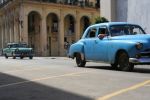
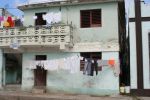
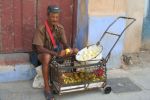


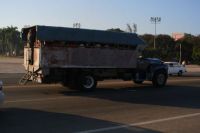
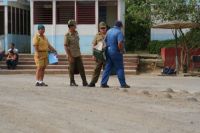
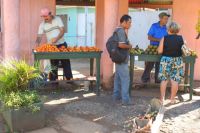


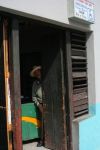


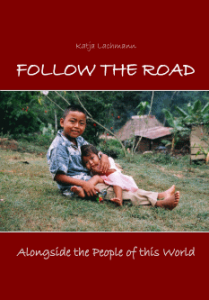
Thanks ,all you guys for the info you have given ,myself and a mate from NZ are going to Cuba for 3 weeks and plan to try and camp rough ,but also use Casas/campismos Any route suggestions ,highlights ,areas,waste of time etc
Unfortunately I have no compassion or empathy for those who would enduce or entertain illegal activity in Cuba. From my experience there social and moral intigrety does not to be corrupted by outside sources.
I’m fascinated by your trip and glad that i’ve found this forum. I would like to get some information about your route (places you visited) and how long it took, because i’m planning to follow in your footsteps))… and actually make a perfect 2-3 weeks’ plan of backpacking.. and also I’ve got a question of safety: how dangerous it is to sleep in a tent for two females there, on the land of liberty?
Hello Olga, sorry for the late reply.
Our route was very spontaneous. We did not strive to see some special places which everybody talks about. People were and are most important in our trip, and we met them everywhere.
Concerning sleeping in the tent. As we write in our Cuba “guide” on this page – anywhere-camping officially is not legal in Cuba, so if you do camp, search for a hidden place – somewhere behind bushes or trees, not visible from the nearby roads or paths – just to make sure you are not on the sight of some communists
Cuba is in general safe, so secret camping for 2 girls should also be no problem.
I plan on cooking for myself, but where can i buy fuel in cuba for a stove? what type of stove do you suggest for the most available fuel supply?
You can easily get fuel in the gas stations in Cuba. 1 liter costs over a dollar (you pay in CUC). And we would suggest you to a stove that works with automobile fuel, i.e. common gas found in the gas stations. That could be the following stoves: Primus Omnifuel, Primus Multifuel, MSR DragonFly, and check out the Optima stoves as well.
Hello,
I would like move to Cuba from Europe and I need for my bussines reliable Internet connection. Please inform me if is possible arrange it in some places.
I will rent some home in this area. Second info, what I need if I would like permanently living in Cuba.
I welcome any informations or help.
Thank you
Ivana
hi every body, I’m live in cuba, I’m cuban and I can answer all the questions you have. If you came to here I can help you to find almost ever thing you want, except drugs and prostitutes, cos my morals. welcome to Cuba.
Hi Chani in Cuba,
I would like to get in touch with you, are you still out there?
Kind regards
Markus
Hi Chani;
Very kind of you to offer.
I am looking for info on extended stay(up to 6 months per).
Been to Cuba twice and loved it.
I have done a lot of reading that answers most questions, but would like some specifics clarified.
regards
Norm
Hi…
Thanks for this great information. I am also a fan of traveling on the unbeaten track where you actually meet people instead of staying in the tourist enclaves…
So a question: I am planning to go to Cuba this summer and I often like to travel with my foldable bike. Is it reasonable to think that I can tour the island on a bike if I have about a month?
Hi Juliet, unfortunately, we cannot give you an answer to your question since we did not bike Cuba. When we were in Cuba we met Louis and Emma, which did a 1,5 year biking tour from North to South America. Details about their journey in Cuba you can find here: http://www.biking-south.blogspot.com All stories are written in French. For further questions, please get back to us with your email address, so we can reply directly to you.
Katja – a few questions.
I like your stype of travel, but we dont have a tent nor a stove.
– Is it easy to find illegal casas? will the local husslers take us to one of them?
– If Im at an illegal casa – would they provide us with ‘illegal’ food. as – dinner for less than 7CUC!
– If we’re arriving at Havana, is it possible to somehow get in contact with an illegal casa owner before we arrive so we can go straight there?
Thanks,
Seb
Hi Seb,
1. Illegal casas: From our experiences you could find them in less touristic areas of a town. Although those people rather find you than opposite. When walking along or resting in less touristic streets with your backpacks Cubans might feel safer to approach and offer you illegal accommodation. Though, please take in account that they are at great risk of punishment when the government finds out.
2. Illegal food: You might ask your host for being provided food, but again, take in account the great risk they undertake. What the price will be I do not know. You will need to negotiate that one. We always cooked for ourselves. If you get along well with fruits, vegetables, bread you should not miss to buy food in local markets. There we usually bought plenty of food for approx. $2. The food lasted at least for two days. Peanut butter or fish conserves you might find in CUC-shops. Another option would be to ask if you could cook in their kitchen for yourselves, so you could live on rice, eggs, beans etc. from the local farmer’s market. In that case be polite and offer paying for the gas or electricity for using the stove. (In legal casas you will not be able to cook besides the room you rent has a kitchen and a stove.)
3. Contacting illegal casas beforehand: I do not know if that is possible. Honestly, I don’t believe it is. Communication is a strict controlled sector in Cuba, and I cannot imagine that anyone would make a contact offering his unlicensed house to foreigners. It is strict forbidden to make black money, and most people only do it in order to survive.
Always remember that maybe it might be unpleasant if you are caught by Cuban officials having accepted illegal accommodation, but who is actually at risk are the Cubans themselves.
George – I think you’re wrong.
The marginal cost of providing local buses to and public transport is zero to budget tourists. The marginal cost of providing subsidized food is practically zero.
The cost is far outweighed by the human interaction that locals have when tourists, when they travel this way.
As Katja said – tourists staying in resorts do provide hard currency, provide some of the human intereaction mentioned above, and a lot of jealousy.
There is also the notion of consumer surplus. Many travellers (such as myself) cannot visit Cuba using CUCs as it’s too expensive, unlike the vast majority of Cuban tourists. So its usually a matter of visiting Cuba using pesos, or not visiting at all.
Your argument seems very much like the ‘Dont buy goods from China because you are exploiting them, as they get paid $2 a day’. $2 a day is a hell of a lot better than $0 a day, as we’ve seen from the likes of Japan then Korea and all the Asian tigers, economies cant suddenly become well developed economics at the click of a finger.
George – I think you are wrong. For example I always try to travel in countries on low budget – and actually especially in Cuba and similar countries the way of traveling these guys here are doing can give more to locals then anything else.
Staying in hotels, traveling by official transportation and so on – all this gives money only to government.
Staying with local people, traveling by hitchhiking etc. gives money to local people directly.
So if you do not really want to support official economy (and of course if you do not have too much money to use for travel), but still want to explore this wonderful country – it is the only and best way..
j.
You seem to be proud travelling cheap in developing countries. In Cuba with its dual-economy you think you are entitled to get your share on subsidised public transport and food. With a little more information about the countries you are travelling you could have avoided being a disgrace. As you said people have to live their on local peso budgets and cannot afford anything else. You could have jobbed back home for two weeks and you would have been able to have a little more money to spend and add your share to the struggling economies instead of being a further burden.
This was by far the most ignorant report I have read in years
George
We believe that tourism, not travelling itself, is no good for other countries; in our opinion it also does not really improve their life. It might seem like at first hand, but instead the gap between the local rich and poor only gets bigger, causing difficulties these cultures had not ever dealt with before the invasion of vacation makers. It causes jealousy, desire, anger, unjust reactions, robbery, death… Money does not do much good in this world, and when we travel we want to meet those who still value human relationships and hospitality more than coins.